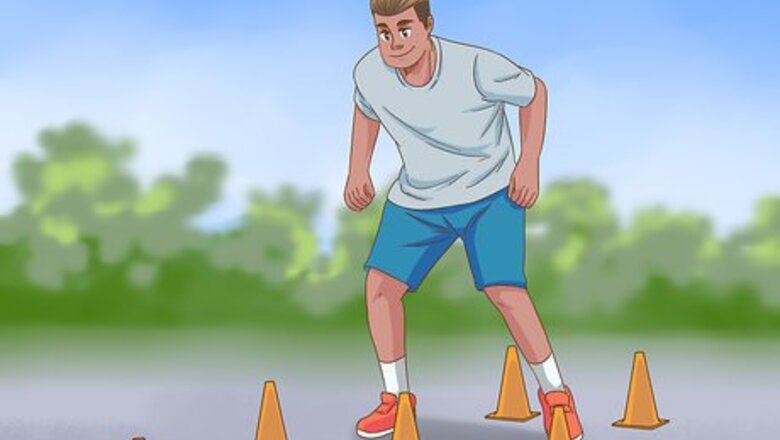
views
Developing Skills on the Field
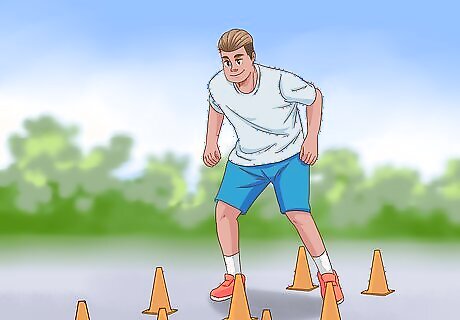
Do cone exercises to increase your speed and agility. Set up 6 rows that are 3 ft (0.91 m) long using 3 cones each. Space each row so they’re 2 ft (0.61 m) apart. Stay in a crouched position and shuffle your feet side to side between the rows. Go through the rows as fast as you can to build agility. After the last row, sprint forward 10 feet (3.0 m) to work on explosive speed. Do at least 10-12 reps of the exercise. To build hip strength, use resistance bands around your thighs for 6-8 of the reps. Agility is an important skill for football players so they can travel with the ball and avoid getting tackled.
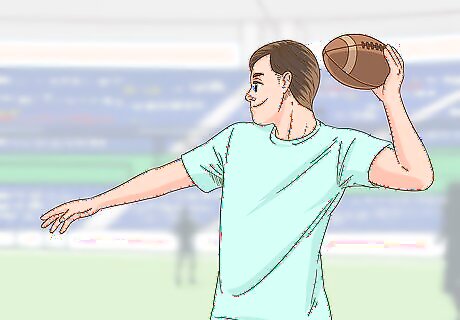
Work on your throwing form. Keep your feet shoulder-width apart, keeping most of your weight on your back foot. Hold the ball in your dominant hand so your fingers are on the laces. Keep your dominant arm at a 90-degree angle as you shift your weight to your front foot. Twist your body so your chest points at your target and straighten your throwing arm so your thumb points down. Toss a ball around with a friend often so you both work on throwing clean passes.
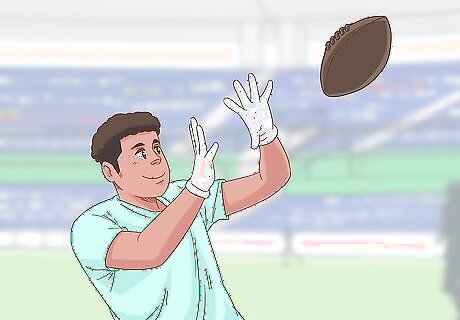
Look for the laces when you’re catching the ball. Focusing on the ball’s laces prevents you from dropping it when you try to make a catch. For added difficulty, practice catching the ball while you run or jog play routes. While practicing, put a small colored sticker on the ball so you can focus on the ball better. Hand Positions for Catching the Ball Hand position is crucial so you don't drop the ball when you try to catch it. Adjust your hands to the following positions for each kind of pass. • In front of your body: pinky fingers together• From behind you: pinky fingers together while turning hands with the ball• Low pass: pinky fingers together• High pass: thumbs together
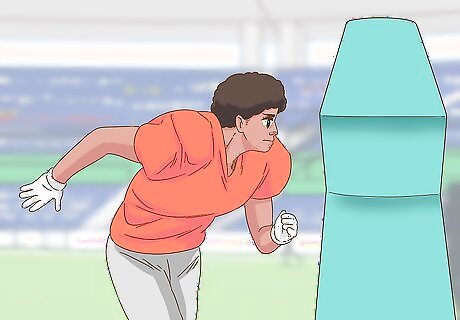
Practice your tackles with a tackling dummy. Don’t tackle at full strength while you’re practicing so you don’t injure yourself or another player. When you make a tackle, wrap your arms low on the dummy and use your shoulder to drive it backward. Push the dummy as far you can or bring it to the ground if you can. Make sure you’re in full football gear when you practice tackling. Otherwise, you may injure yourself or another player.
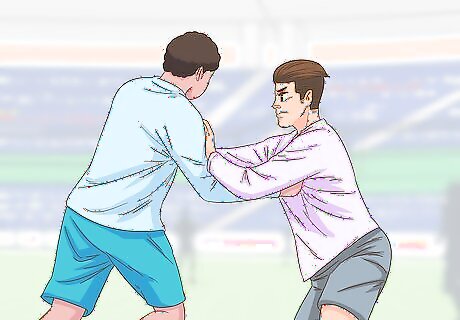
Do hand drills if you want to be a lineman. Work with another player or partner on your drills. Keep your feet shoulder-width apart across from the other player. Have the “offensive” player try to touch the “defensive” player’s chest. If you’re the defensive player, react quickly and try to knock their hands away from your chest. Working with your hands as a lineman helps you block other players so they can’t run up through the middle of the line.
Building Physical Strength

Work out at a gym 4 days a week. Work on getting lean muscles by using lower weights and performing more repetitions. Focus on different muscle groups each day to get a full body workout over the course of your week. As exercises get easier for you, increase the weight you work with as well as the number of reps you perform. Adjust your workout based on where you are in the football season. If you’re injured or have a busy week, you may adjust to a lighter intensity workout to compensate.

Build cardio endurance by running and jogging. Cardio makes a great warm-up routine as well as increases your physical stamina. Plan to run for at least 10-15 minutes before days when you work out, and go for longer distance runs each other day. Practice shorter sprints to work on your explosive power. Perform cardio exercises 2-3 times per week.
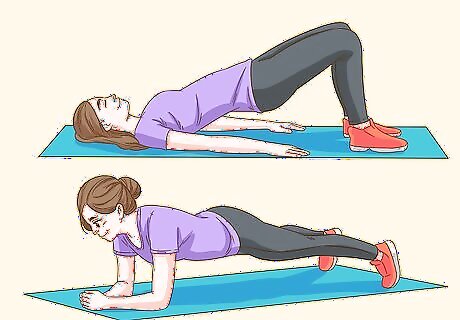
Strengthen your core with planks and ab exercises. Start on your hands and knees. Rest your forearms on the ground so your elbows are at a 90-degree angle. Walk your feet back so your body forms a straight line. Hold the position for as long as you can to activate your core. Other core exercises include sit-ups and push-ups. Perform ab workouts 1-2 times per week.
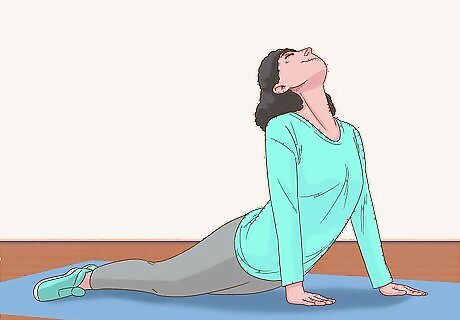
Stretch after working out to maintain your flexibility. Once you’re finished with a workout, take time to relax and stretch your muscles. Stretching helps prevent injuries and keeps you more flexible for a better performance. Flexibility increases your range of motion while playing football.

Maintain a proper nutrition with carbs and lean proteins. Stick to eating foods like fruits, vegetables, breads, and pastas, especially before playing a game. Get your protein from fish, seafood, white meat like chicken, and eggs. Avoid eating any oily or fried foods. Have a protein shake or protein powder if you don’t have the time for a regular meal. Stay hydrated throughout the day with water or drinks with electrolytes.
Getting in a Football Mindset

Visualize your success to overcome mental limitations. In order to be a great football player, you need to be completely passionate about the sport. Write down your specific goals for football and always keep those in mind while you’re playing and practicing. Don’t let others tell you what you can and cannot do. If you’re passionate about playing football, keep persevering to achieve your goals. Tom Brady Tom Brady, Professional Football Player Becoming mentally tough will help you prepare and compete. "To me, football is so much about mental toughness, it's digging deep, it's doing whatever you need to do to help a team win and that comes in a lot of shapes and forms."
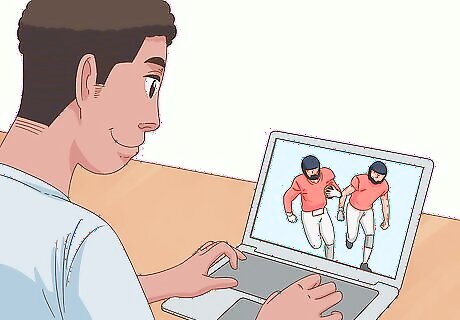
Watch old football videos to learn plays and techniques. Watch old game videos and listen to the commentary so you understand what the players are doing. Pay attention to the positions that you play or want to play to see how the players act in different situations. Ask a coach for plays or games they recommend for you.

Memorize your playbook. Transfer all of your plays onto flashcards so the route is on one side and the name of the play is on the other. Flip through your flashcards name side up and try to explain the routes in each play. Keep studying the plays until you have them committed to memory. If you don’t have a playbook, look online for common routes that teams run. Practice running your position in the plays if you have the space.
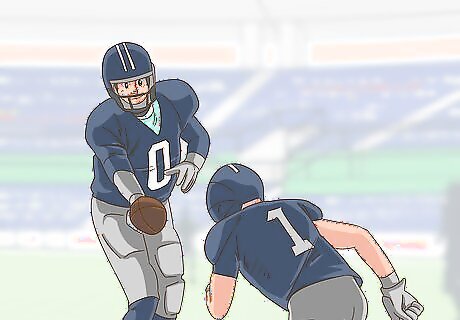
Be a team player. You can’t play football without the rest of your team. Pay attention to what plays they’re running and work with them to succeed. Support one another as you practice and play together. The more you support and get behind one another, the better you'll play as a team. Tell your teammates when they make a good play to cheer them on. Don’t try to show off and go solo. Always work and talk with your team.











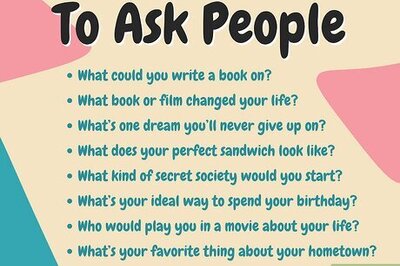





Comments
0 comment